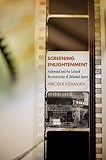Screening Enlightenment : Hollywood and the Cultural Reconstruction of Defeated Japan / Hiroshi Kitamura.
Material type: TextSeries: The United States in the WorldPublisher: Ithaca, NY : Cornell University Press, [2011]Copyright date: 2017Description: 1 online resource (280 p.) : 15 halftones, 1 chart/graph, 2 tablesContent type:
TextSeries: The United States in the WorldPublisher: Ithaca, NY : Cornell University Press, [2011]Copyright date: 2017Description: 1 online resource (280 p.) : 15 halftones, 1 chart/graph, 2 tablesContent type: - 9780801460227
- Motion pictures -- Social aspects -- History -- Japan
- Motion pictures -- Social aspects -- Japan -- History
- Motion pictures, American -- Influence -- Japan
- Motion pictures, American -- Japan -- Influence
- Asian Studies
- Film
- U.S. History
- PERFORMING ARTS / Film & Video / History & Criticism
- filmmaking, US-Japan relation, American moviemakers, Hollywood, American occupation, films in postwar Japan, cultural reconstruction of Japan, American occupation policy, diplomatic history, film studies
- 791.43/63585204 22
- PN1993.5.J3 K57 2010eb
- online - DeGruyter
| Item type | Current library | Call number | URL | Status | Notes | Barcode | |
|---|---|---|---|---|---|---|---|
 eBook
eBook
|
Biblioteca "Angelicum" Pont. Univ. S.Tommaso d'Aquino Nuvola online | online - DeGruyter (Browse shelf(Opens below)) | Online access | Not for loan (Accesso limitato) | Accesso per gli utenti autorizzati / Access for authorized users | (dgr)9780801460227 |
Browsing Biblioteca "Angelicum" Pont. Univ. S.Tommaso d'Aquino shelves, Shelving location: Nuvola online Close shelf browser (Hides shelf browser)

|

|

|

|

|

|

|
||
| online - DeGruyter Women and Aristocratic Culture in the Carolingian World / | online - DeGruyter The Captive and the Gift : Cultural Histories of Sovereignty in Russia and the Caucasus / | online - DeGruyter Enlightening the World : The Creation of the Statue of Liberty / | online - DeGruyter Screening Enlightenment : Hollywood and the Cultural Reconstruction of Defeated Japan / | online - DeGruyter Nabokov, Perversely / | online - DeGruyter The Odd Man Karakozov : Imperial Russia, Modernity, and the Birth of Terrorism / | online - DeGruyter Albert Camus : Elements of a Life / |
Frontmatter -- Contents -- Preface -- Chapter 1. Thwarted Ambitions -- Chapter 2. Renewed Intimacies -- Chapter 3. Contested Terrains -- Chapter 4. Corporatist Tensions -- Chapter 5. Fountains of Culture -- Chapter 6. Presenting Culture -- Chapter 7. Seeking Enlightenment. The Culture Elites and American Movies -- Chapter 8. Choosing America. Eiga No tomo and the Making of A New Fan Culture -- Conclusion -- Appendix -- Notes -- Bibliography -- Acknowledgments -- Index
restricted access online access with authorization star
http://purl.org/coar/access_right/c_16ec
During the six-and-a-half-year occupation of Japan (1945–1952), U.S. film studios—in close coordination with Douglas MacArthur's Supreme Command for the Allied Powers—launched an ambitious campaign to extend their power and influence in a historically rich but challenging film market. In this far-reaching "enlightenment campaign," Hollywood studios disseminated more than six hundred films to theaters, earned significant profits, and showcased the American way of life as a political, social, and cultural model for the war-shattered Japanese population. In Screening Enlightenment, Hiroshi Kitamura shows how this expansive attempt at cultural globalization helped transform Japan into one of Hollywood's key markets. He also demonstrates the prominent role American cinema played in the "reeducation" and "reorientation" of the Japanese on behalf of the U.S. government.According to Kitamura, Hollywood achieved widespread results by turning to the support of U.S. government and military authorities, which offered privileged deals to American movies while rigorously controlling Japanese and other cinematic products. The presentation of American ideas and values as an emblem of culture, democracy, and sophistication also allowed the U.S. film industry to expand. However, the studios' efforts would not have been nearly as extensive without the Japanese intermediaries and consumers who interestingly served as the program's best publicists. Drawing on a wide range of sources, from studio memos and official documents of the occupation to publicity materials and Japanese fan magazines, Kitamura shows how many Japanese supported Hollywood and became active agents of Americanization. A truly interdisciplinary book that combines U.S. diplomatic and cultural history, film and media studies, and modern Japanese history, Screening Enlightenment offers new insights into the origins of this unique political and cultural transpacific relationship.
Mode of access: Internet via World Wide Web.
In English.
Description based on online resource; title from PDF title page (publisher's Web site, viewed 26. Aug 2024)


